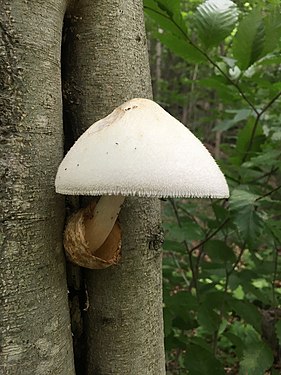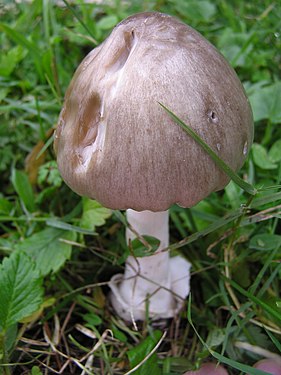Biology:Volva (mycology)

In mycology, a volva is a cup-like structure at the base of a mushroom that is a remnant of the universal veil,[1] or the remains of the peridium that encloses the immature fruit bodies of gasteroid fungi.[2] This macrofeature is important in wild mushroom identification because it is an easily observed, taxonomically significant feature that frequently signifies a member of Amanitaceae. This has particular importance due to the disproportionately high number of deadly poisonous species contained within that family.
A mushroom's volva is often partially or completely buried in the ground, and therefore care must be taken to check for its presence when identifying mushrooms.[3] Cutting or pulling mushrooms and attempting to identify them later without having noted this feature could be a fatal error.
Whilst a volva is a feature best known from Amanita species and stinkhorns such as the Phallaceae family and others in the Phallales order, it may also occur with other genera including:
Some other species such as Leucoagaricus volvatus, Leucoagaricus bivelatus also display a volva despite this not being a typical trait for these genera.[4]
In the Conocybe genus only six species out of the almost 300 described species are known to have a volva: C. anthuriae,[5] C. corneri,[5] C hornana,[5] C. locellina,[5] C. vaginata,[5] C. volvata.[6]
Volvariella surrecta growing parasitically
References
- ↑ Dictionary of the Fungi (10th ed.). Wallingford, UK: CAB International. 2008. p. 727. ISBN 978-0-85199-826-8.
- ↑ Gasteromycetes: Morphological and Developmental Features, with Keys to the Orders, Families, and Genera. Eureka, California: Mad River Press. 1988. p. 133. ISBN 0-916422-74-7.
- ↑ Kuo M. (2007). 100 Edible Mushrooms. Ann Arbor, Michigan: The University of Michigan Press. p. 45. ISBN 978-0-472-03126-9. https://archive.org/details/100ediblemushroo00kuom/page/45.
- ↑ Akers, Brian P.; Ovrebo, Clark L. (2005). "Leucoagaricus bivelatus, a new volvate leptoid species". Mycotaxon 91: 303-308. http://www.cybertruffle.org.uk/cyberliber/59575/0091/0307.htm.
- ↑ 5.0 5.1 5.2 5.3 5.4 Watling, Roy; Hausknecht, Anton (1997). "Conocybe anthuriae, a new volvate species from Mauritius (Africa)". Österreichische Zeitschrift für Pilzkunde 6. https://www.zobodat.at/pdf/OestZPilz_6_0055-0059.pdf.
- ↑ Agretious Thomas, K.; Hausknecht, Anton; Manimohan, P. (2001). "Bolbitiaceae of Kerala State, India: New species and new and noteworthy records.". Österreichische Zeitschrift für Pilzkunde 10: 87 - 114. https://www.zobodat.at/pdf/OestZPilz_10_0087-0114.pdf.
See also
 |





